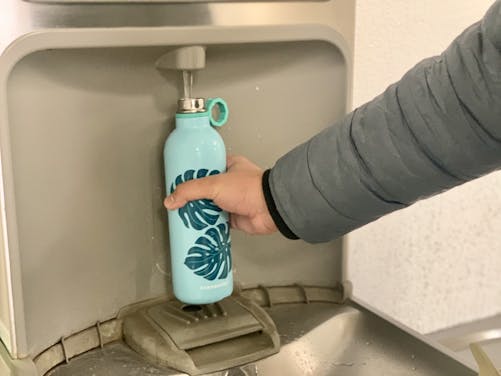Conversations and global movements surrounding climate change in the last few years have taken off.
Greta Thunberg, even at 16 years old, has taken the climate change movement by storm.
And while not everyone has the platform Thunberg and other influencers may have, they can still make an impact on the smaller scale.
Thinking about the future of your planet and its potential doom can be overwhelming, but here are some easy ways to reduce your impact on climate change on a small-scale level:
Avoid single-use plastics:

There is no easy way to safely dispose of the plastic waste we produce.
Incinerating plastic leads to air pollution, it takes hundreds of years to decompose in a landfill — releasing toxic chemicals into the soil and water we consume — and dumping it into the ocean puts marine life at risk, in turn negatively affecting the ecosystem.
A feasible solution to this problem is to produce less waste in the first place. Developing simple habits like carrying reusable mugs and metal straws to a coffee shop, and using your own cutlery and a container when you’re taking food to go, can make a difference.
It’s best to avoid buying plastic water bottles, so bringing a metal bottle and filling it up in the water fountains can make a difference and also save you money. Carrying a cloth tote bag while grocery shopping also reduces the amount of plastic waste we produce.
While these things seem like a no-brainer, it can be difficult to incorporate these habits into your daily routine. Putting a reminder on your phone and packing your bag the night before can be helpful.

Thrifting:
The fast-fashion industry is one of the largest polluters of the environment. Shopping til’ you drop can be gratifying, but it comes at a cost. Fast fashion is cheap, trendy and readily available; however, by buying more clothes, we’re contributing to the pollution.
A great alternative to fast fashion and expensive sustainable brands is thrifting. By thrifting clothes and accessories, you can still be fashionable but at a lower cost to the environment. Some nearby and popular places to thrift in Buffalo are Plato’s Closet, Savers and AMVETS, among others, some featured in The Spectrum’s guide to thrifting in Buffalo. If you don’t have the time or access to go to an actual thrift store, there are also online options to explore such as thredUP, Depop and Poshmark.

Transportation:
Driving your car around releases a ton of greenhouse gases that are warming up the planet. According to the EPA, “a typical passenger vehicle emits about 4.6 metric tons of carbon dioxide per year.” Imagine this on a large-scale level.
For many, ditching your car and using public transport instead is a simple way to reduce your carbon footprint. If you don’t live in a city with a well-connected public transportation system, carpooling with friends and family whenever possible can still make a difference, but Buffalo’s metro is a useful and smart way to get around.
Travel greener:
Whenever we are traveling on airplanes, we are contributing to the release of carbon emissions. And a lot at that.
Flying cannot be avoided in most cases, but you can reduce your carbon footprint by packing light instead. The more weight an airplane is carrying, the more fuel it needs, leading to increased emissions of greenhouse gases.
Another way to reduce your carbon footprint while flying is to take direct flights whenever possible because a plane takes up the most fuel during take-off.
Avoid red meat:
A major source of methane — a greenhouse gas more harmful than carbon dioxide — into the atmosphere is cattle grazing. While agriculture and raising livestock produces methane, the emissions from cows are much larger in comparison to other sources.
Going vegan is not easy considering most people have been raised with meat and dairy in their diets. However, making small changes to our diet by avoiding red meat or at least reducing how much we eat it can significantly reduce our carbon footprint.
Vindhya Burugupalli is a senior multimedia editor and can be reached at vindhya.burugupalli@ubspectrum.comand on Twitter @moonhorizon__

Vindhya Burugupalli is the engagement editor for The Spectrum. She loves traveling and documenting her experiences through mp4s and jpegs. In her free time, she can be found exploring cute coffee shops and food spots.





